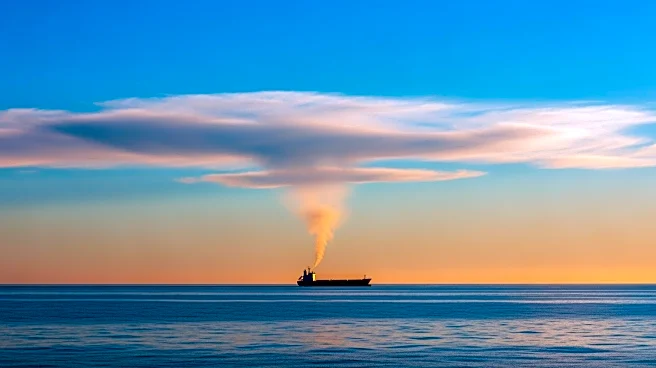What's Happening?
Researchers from Florida State University, led by atmospheric scientist Michael Diamond, have studied the effects of rerouted shipping lanes on cloud formation in the South Atlantic. The study, published
in Atmospheric Chemistry and Physics, reveals that new fuel regulations, which reduced sulfur content by 80%, have significantly decreased cloud droplet formation by 67%. This research was prompted by militia attacks in the Red Sea, which caused a shift in shipping routes, offering a unique opportunity to study aerosol-cloud interactions. The findings aim to reduce uncertainty in global climate projections by providing insights into how cleaner fuels impact cloud formation.
Why It's Important?
The study's findings are crucial for refining global climate models, which are essential for accurate climate predictions. By understanding aerosol-cloud interactions, policymakers can better assess the impact of environmental policies on human health and climate change. The reduction in sulfur emissions from ships, mandated by the International Maritime Organization in 2020, has implications for Earth's energy balance, as it affects cloud brightness and the cooling effect that masks greenhouse gas warming. This research helps address the largest source of uncertainty in climate projections, potentially guiding future environmental regulations.
What's Next?
The research provides a natural test case for observing the direct effects of ship emissions on cloud formation, which could influence future studies and policy decisions. As scientists continue to debate the extent of cloudiness changes post-IMO 2020, further research may focus on the role of increased sunlight absorption in marine heatwaves. The study's insights could lead to more targeted environmental policies and strategies to mitigate climate change impacts.
Beyond the Headlines
The study highlights the complex interplay between human activities and natural phenomena, emphasizing the need for comprehensive climate models. The unexpected rerouting of ships due to conflict rather than policy or weather provides a rare opportunity to isolate the effects of emissions on cloud formation. This underscores the importance of considering geopolitical factors in environmental research and policy-making.










